Existentialist morality and the right to die
Fred Hutchison, RenewAmerica analyst
 Originally published April 12, 2005
Originally published April 12, 2005
By coincidence, both Terri Schiavo and Pope John Paul II, the great advocate of the value of life, had feeding tubes inserted by doctors. Both Terri and the pope evidenced the desire to live: Terri did so by her sunny attitudes, and the pope did so by his writings about the sanctity of life.
The difference was that Terri was not dying, nor did she have control of events. The aged pope was dying, but could dictate what his health care should be.
Terri's feeding tube was pulled out in spite of her apparent desire to live, and she died according to the will of others. It was a painful death in spite of all the denials. The pope died at the time decreed by divine providence. He was peaceful at the end and his last word was "amen," meaning "so be it," as though he was accepting a visit of the death angel. He agreed with death when it came, but he did not arrange for its early arrival. He agreed with life until the appointed time of his departure from his mortal body.
Do we have the right to decide the hour of our death, or do we have the duty to live until the death angel comes for us? Is heaven the rightful arbiter of life and death, or do men have the right to take such matters into their own hands?
Common Christian experience teaches that in most cases, God keeps the time and circumstances of one's death secret, as though this information is something that trembling, fragile mortals cannot handle. Yet a large, influential minority of the population believes that the individual should have the right to determine the time and means of his death, once he decides that life is not worth living.
But is there any such thing as a "life not worth living?" Are not these code words that mean, "I lack the moral courage to face certain kinds of suffering?" Or do they mean, "I refuse to be humbled, lose control, and be reduced to a dependent state?"
Of course, the pride one refuses to surrender is partly an illusion. The control that some folks cannot bear to yield is partly an illusion. Many people can change aspects of their mode of living, and some can have a significant influence upon the world if they mean to have it, but mere mortals have no control of outcomes.
The illusion of control
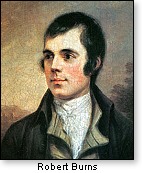 "The best laid plans of mice and men gang aft agley" (Robert Burns). (The best plans go askew.) Translations of Scottish dialect invariably water down the color and force of idiomatic expressions. "Gang aft agley" might signify to a man with Scottish peasant roots like Burns, a practical disaster. Picture Burns carefully steering a cart down a hill on a country lane. The cart picks up speed, breaks away, and runs "gang aft agley" off the road and crashes into a stone wall. A smart plan, good strong arm, and fixed will cannot insure against unexpectedly bad outcomes.
"The best laid plans of mice and men gang aft agley" (Robert Burns). (The best plans go askew.) Translations of Scottish dialect invariably water down the color and force of idiomatic expressions. "Gang aft agley" might signify to a man with Scottish peasant roots like Burns, a practical disaster. Picture Burns carefully steering a cart down a hill on a country lane. The cart picks up speed, breaks away, and runs "gang aft agley" off the road and crashes into a stone wall. A smart plan, good strong arm, and fixed will cannot insure against unexpectedly bad outcomes.
Doctors were certain that Terri would not suffer, but she suffered anyway. The carefully steered cart went off the road and crashed. We cannot control outcomes, and our myopic eyes blur and our clumsy hands fumble when we try to manipulate the delicate process of dying.
In Shakespeare's Romeo and Juliette, Juliette took a potion that simulated death to escape an arranged marriage and then, with assistance, planned to sneak out of the tomb and elope with Romeo. The plan went awry because Romeo failed to receive the message that explained the plan. He discovered Juliet ostensibly dead in the tomb and killed himself. She awakened to find him laying dead next to her and killed herself. Disaster leads to disaster.
The classical Greeks understood that the hero can perform wondrous exploits, but only the gods can control destiny. If the hero was destined by the gods to doom, he was accounted noble if he behaved himself virtuously, fought his appointed battles, and displayed manly fortitude and insouciant flair as he calmly sailed with resignation into the jaws of inescapable death. The Greek heroes went to their doom with style, much like British gentlemen of a prior century who would tell dry jokes and puns on their way to the gallows.
The pope was as dry as an Englishman during his last days. He was asked how he felt during a time when he was wracked with pain. As a man calmly reconciled to his death, he responded with dry insouciance, "Below the neck, not so good." (I.e., I am fine, but this donkey of a body has gang aft agley.)
In contrast to the Greek, English, and papal model, the European tragic literature is fatalistic, for the hero had a hand in bringing himself down. In spite of all his virtues, powers, and victories, he is defeated in the end by a fatal flaw in character. For all his powers to bring change to the world and all his cleverness to manipulate events, he cannot stage-manage the outcome of his personal story. Despite all his influence upon events, the world spins off in directions he never imagined. Faust and MacBeth were tragedies of this kind.
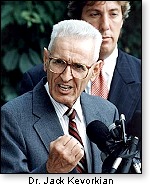 A life worth living
A life worth living
The right-to-die movement insists we can be in control and we have the ability to know if life is worth living. Can we know when life is not worth living? Interestingly, the demand for Dr. Kevorkian's assisted suicides declined sharply when doctors started to aggressively treat chronic pain in the elderly, physically afflicted, and depressed. This medical revolution involves aggressive prescription drugs to relieve physical pain, and more subtle treatments of drugs and counseling to relieve the psychological pain of depression. Most requests for death are despairing desires to escape physical and psychological pain. Once the pain is relieved through medical treatment, the innate desire to live returns in most cases and thoughts of calling Dr. Death for assisted suicide are put away.
An investigation of the capers of Dr. Death might reveal some carts that have gang aft agley. Some folks are astonishingly difficult to kill. Murder is messy, and the Hollywood image of the hit man who administers a quick, clean, efficient death is a myth. The fastest way to disillusion a woman's right-to-choose advocate is to have her watch an abortion and to supply her with a barf bag in case she becomes ill. Life is beautiful, and murder is ugly. Death by enforced dehydration and starvation, as Terri Schiavo suffered, is one of the ugliest.
The pope was in great pain, but did not seek death because he had spiritual hope and believed that pain can play a role in the sanctification process. (See the pope's favorite book, The Dark Night of the Soul by St. John of the Cross, or see my book titled The Stages of Sanctification, at Amazon.com, for more information about links between pain and sanctification.) Spiritual hope reinforces the innate desire to live, and spiritual duty engenders a commitment to complete the earthly journey assigned according to providential design, and to endure fiery ordeals in trust and surrender.
As for estimating what a "life worth living" might be, is any mortal being capable of understanding the mystery of life, much less able to evaluate the worthiness of a life? Such assessments are invariably made on shallow grounds, such as whether a person feels happy or useful.
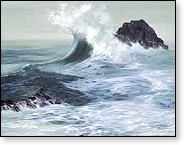 A feeling of liberation and new wisdom often comes with the realization that life does not necessarily have to have happy feelings or be useful in a utilitarian sense. Life in innately good apart from such calculations. The Creator has priorities for life that go far beyond transitory feelings and practical functions. Feelings and functions are the surface froth of a deep ocean. A spiritually and intellectually shallow society is easily seduced by spurious and superficial values based upon the surface froth of life, and may lapse into a dysfunctional code of morality.
A feeling of liberation and new wisdom often comes with the realization that life does not necessarily have to have happy feelings or be useful in a utilitarian sense. Life in innately good apart from such calculations. The Creator has priorities for life that go far beyond transitory feelings and practical functions. Feelings and functions are the surface froth of a deep ocean. A spiritually and intellectually shallow society is easily seduced by spurious and superficial values based upon the surface froth of life, and may lapse into a dysfunctional code of morality.
Why did the Terri Schiavo case center around the question of what Terri "would have wanted before her brain damage if she knew what was ahead"? From whence comes the assumption that a person should be allowed to commit suicide if they want to? If we recall the Existentialist revolution of the 1950's and sixties, some of the answers come clear.
The Existentialist revolution
Americans have valued free will and personal autonomy since the founding of the Republic. However, prior generations did not necessarily associate the act of choosing with virtue or being in the right. After all, one may freely choose vice, perversion, and criminality. The freely chosen course of action must be moral and wise to be worthy of commendation.
The philosophy of Existentialism places the emphasis on the mode of choosing, instead of the intended outcomes of the choice. It places the value upon subjective questions such as whether the choice was really free — independent of pressures to conform — and whether the person is committed to his choice. What matters to Existentialists is whether one's choices are "authentic" and "sincere."
These are indeed interesting questions.
But if these are the only questions we ask, we may never get around to considering whether the outcomes of our decisions are wise, prudent, responsible, and edifying to our families and our communities. If others get hurt by our choices, it is easy to evade responsibility if we look at the freedom of the will as the highest arbiter. "Let my will be done though the heavens fall." This is deliberate misquote of Lord Mansfield's famous saying concerning a slavery trial, "Let justice be done though the heavens fall." Existentialism replaces justice with free will as the highest imperative. When free will becomes an end in itself, the moral law is brushed aside. The universal moral law exists so that man should learn to live within boundaries and reign in his will, so that freedom is a blessing and not a curse.
Existentialism and commitment
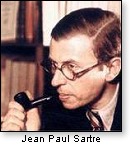 The philosophy of Existentialism has gone through a complex and tangled development since the time of Soren Kierkegaard (1813–1855), who invented a Christian Existentialism of sorts. The form of Existentialism that influenced American culture in the 1950's and 60's was the atheistic French Existentialism promoted by Jean Paul Sartre (1905–1980) and Albert Camus (1913–1960). Sartre and Camus rejected the universal moral law and values imposed by society.
The philosophy of Existentialism has gone through a complex and tangled development since the time of Soren Kierkegaard (1813–1855), who invented a Christian Existentialism of sorts. The form of Existentialism that influenced American culture in the 1950's and 60's was the atheistic French Existentialism promoted by Jean Paul Sartre (1905–1980) and Albert Camus (1913–1960). Sartre and Camus rejected the universal moral law and values imposed by society.
Sartre insisted that human existence is always individual and particular. It is always a case of my existence and your existence, and the two are radically separate as though each of us lives sealed in a morally air-tight world. Sartre defined existence as a mode of being. The way one chooses to live is his particular mode of being. As the individual chooses from a wide range of possibilities and commits himself to those choices, he defines his existence.
What is important to Sartre is not which choices are made, but how they are made. What matters is whether the choices are made with commitment and sincerity, and whether one chooses with absolute freedom — that is to say, freedom from guile, from the conformist opinions of others, from the values of society, and any notion of a transcendent realm or a universal moral law.
An Existentialist can be hard as nails in sticking to his choices once he convinces himself he chose freely, sincerely, and with commitment. If someone condemns his choice based upon a higher moral law, he will be outraged. The Existentialist is convinced that he has the right to contrive a private moral world all of his own, and any challenge to that private world is a moral outrage and a threat to freedom. These folks are in earnest and they are not playing games — to the extent they are real Existentialists, and not mere hypocrites playing Existentialist games to rationalize misbehavior. The two kinds are hard to tell apart, of course.
What do Existentialists mean when they speak about commitment? They often mean sticking with a decision and not worrying overmuch about the outcomes. Sincerity in the decision and commitment to the decision are tests of "authenticity."
One has an authentic existence if he chooses his mode of life with sincerity and commitment. Does commitment mean taking responsibility for one's actions? In the sense of standing up for one's decisions, yes. In the sense of taking responsibility for the harm one's actions cause others, maybe not. A nihilism and antisocial streak runs through the writings of Sartre and Camus.
 Once one severs the links with the universal moral law and with obligations to society, sliding down the slippery slope towards narcissism, nihilism, and irresponsible behavior are almost inevitable. Sartre himself slid down that slope. He sat through World War II in Paris sidewalk cafes jotting notes about his philosophical ideas. Kierkegaard would have regarded that as inauthentic, irresponsible, and unaware behavior, and sins against Existentialist ideals.
Once one severs the links with the universal moral law and with obligations to society, sliding down the slippery slope towards narcissism, nihilism, and irresponsible behavior are almost inevitable. Sartre himself slid down that slope. He sat through World War II in Paris sidewalk cafes jotting notes about his philosophical ideas. Kierkegaard would have regarded that as inauthentic, irresponsible, and unaware behavior, and sins against Existentialist ideals.
During the sixties, Sartre demonstrated his "commitment" by becoming a quasi-Marxist and visiting college campuses and egging on the rioting students to revolution. The economic determinism, utopian ideals, and socialist theory of Marxism meant nothing to Sartre. Communist totalitarian socialist systems are the very nemesis of the radical freedom of Existentialism. The essential thing to Sartre was active commitment to a movement that defies the "system" and its conformist values.
But to overthrow a system that upholds human rights and the freedom to be an Existentialist is irresponsible. Sartre slipped far from taking responsibility for the potential outcomes of his actions. If Sartre was capable of such cosmic irresponsibility, how likely is it that he would take responsibility for a wrong done to his neighbor? Existentialism is strong on the rights of freedom, but is weak on the responsibility of the citizen.
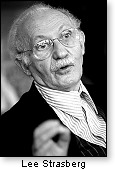 The slow infection of Existentialism
The slow infection of Existentialism
During the 1950's, French Existentialism became popular among American intellectuals and its bohemian subculture. Lee Strasberg, the founder of the Actor's Studio, invented "method acting" in which the motions of an actor are guided by spontaneous feelings, discovered through emotional introspection. Such acting is "authentic" and not mimed.
Method acting is a mixture of Existentialism and the phenomenology of Edmund Husserl (1859–1938). Indeed, Husserl was as much the father of French Existentialism as was Kierkegaard. That is why Existentialists of the fifties talked so much about feelings and why the Actor's Studio was preoccupied with moods and feelings.
Hollywood method actors like James Dean, Marlon Brando, Paul Newman, and Rod Steiger, who were graduates of the Actor's Studio, introduced the American public to emotion-driven Existential attitudes. Even Marilyn Monroe became a protege of Lee Strasberg and became a method actor, a decision that proved fatal to that emotionally-disturbed woman.
The emotive method-acting fad began to wind down when Clint Eastwood demonstrated in the "spaghetti westerns" that the cool minimalism of a man of steely will can be more powerful on the screen than sincere hysteria of the "Hey Stella!" variety, or the unfocused slouch and mumble. "What are you rebelling against," you rebel without a cause? "Whad ya got?" was the inarticulate response. Nonetheless, the slow infection of Existentialism seeped into the pores of the general public through the method actors in Hollywood films of the fifties and early sixties.
During the sixties, Existentialism became a fad on the college campus. The intellectual students attended Existentialist lectures, read Existentialist theory, or went to Existentialist plays. But most students acquired Existentialism by osmosis, from a mood in the air, from music and films such as Easy Rider and The Graduate, and from the Zeitgeist (the
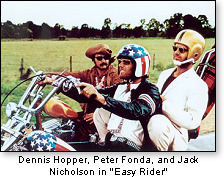 spirit of the age). During the late sixties, many campuses had Woodstock-style rock and drug festivals, political upheavals, and a sexual revolution.
spirit of the age). During the late sixties, many campuses had Woodstock-style rock and drug festivals, political upheavals, and a sexual revolution.
An acquaintance of mine in college justified his sex with a casual girl friend as 1) mutual consent, and 2) a "beautiful experience." He was an Existentialist because he said this in dead earnest with no winks, nods, or smirks. Consent and good feelings make it authentic, or so he believed.
An attractive, promiscuous girl rejected the proposal of marriage from a friend of mine because he was not "sincere." She was more promiscuous than he was, and he was more interested in the commitment of marriage than she was, but somehow he failed her sincerity test. His wounded emotions after this rejection seemed pretty sincere to me. Promiscuous Existentialists are very sincere in their way, of course. After all, Sartre had a harem of groupies, and he was a morbidly serious man. One can be dreadfully sincere about hedonism and nihilism, especially if one is French.
The sexual revolution and abortion
Existentialism on the campus — devoted to carpe diem (seize the day), and indifferent to consequences — swiftly led to a sexual revolution in academia in the late sixties. The infection spread to the general culture in the seventies. It was greatly aided by pop psychology which promoted "self-esteem," "self-actualization," and "taking control of your life." Soon, just as the sexual revolution was in transition from campus to general culture, abortion became a major issue and was hastily placed into law by liberal-minded judges.
 Planned Parenthood vs. Casey (1992) reveals that a majority of the court supports Existentialist values concerning abortion. Justice Anthony Kennedy wrote in his opinion, "At the heart of liberty is the right to define one's own concept of existence, of meaning, of the universe, and the mystery of life." These words are pure Existentialism and could have been written by Sartre or Camus.
Planned Parenthood vs. Casey (1992) reveals that a majority of the court supports Existentialist values concerning abortion. Justice Anthony Kennedy wrote in his opinion, "At the heart of liberty is the right to define one's own concept of existence, of meaning, of the universe, and the mystery of life." These words are pure Existentialism and could have been written by Sartre or Camus.
Defining one's own mode of existence is the very heart of the Existentialist project. However, not only is the personal mode of living to be self-defined, the universe and life itself are to be self-defined. If all men invent their own private universe, how can society exist? For that matter, how can a family or a community exist? If one is free to concoct a private definition of life, how can murder be contained? The murderer can claim that his victim did not deserve to live because he was not living an authentic life. Justice Kennedy's Existential line is a code for nihilism, anarchy, and violence.
 The culture of abortion is Existentialist in its values. A woman's "right to choose" was contrasted by the feminists with the "bondage" of the old days, when women were hemmed in with responsibilities to others. Nothing less than radical Existentialist freedom would do for the new liberated woman. Even the idea that actions have consequences must not interfere with absolute freedom. If a woman chose sex for purposes of "self-actualization," no consequences like pregnancy must block the way. The impediment must be removed because achieving a free personhood of Existential authenticity is all that really matters.
The culture of abortion is Existentialist in its values. A woman's "right to choose" was contrasted by the feminists with the "bondage" of the old days, when women were hemmed in with responsibilities to others. Nothing less than radical Existentialist freedom would do for the new liberated woman. Even the idea that actions have consequences must not interfere with absolute freedom. If a woman chose sex for purposes of "self-actualization," no consequences like pregnancy must block the way. The impediment must be removed because achieving a free personhood of Existential authenticity is all that really matters.
The hermetically-sealed narcissism of Existentialism makes it easy to look at the babe in the womb as a hunk of protoplasm that is part of the woman's body. As long as the baby is regarded as a possession of the mother and not a body, soul, and life in its own right, the shadow of Existentialism will hang over the land.
Sexual promiscuity, Existentialist style, and the shattered family will bring infinite injury to this unhappy land. When each person is seeking absolute freedom of the will as the highest virtue, there is no place left for the fidelity and responsibility of family life.
Dismal conclusions
After a holocaust of forty million aborted babies, the right to slaughter the innocent has been established in our laws and mores. The right to kill a baby in the womb has been extended to the right to kill a helpless person by removing her food and water. This was recently sustained by the Existentialist courts, of course.
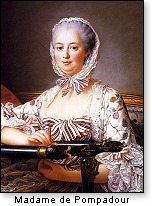 When each man becomes like a god and does what is right in his own eyes, the earth is filled with violence. (See Genesis 6:5, 11.) The radical atheism of French Existentialism insists upon absolute freedom, creating itself, by itself, thus assuming to itself the function of God. C. S. Lewis said, "When love becomes a god, it turns into a devil." Following this line of thought, when free will becomes a god, it turns into an agency for evil. At this point, we have dug down to the very core of the culture war. Our most urgent mission is to convince the American people that although free will is potentially good within limits, it is not a god.
When each man becomes like a god and does what is right in his own eyes, the earth is filled with violence. (See Genesis 6:5, 11.) The radical atheism of French Existentialism insists upon absolute freedom, creating itself, by itself, thus assuming to itself the function of God. C. S. Lewis said, "When love becomes a god, it turns into a devil." Following this line of thought, when free will becomes a god, it turns into an agency for evil. At this point, we have dug down to the very core of the culture war. Our most urgent mission is to convince the American people that although free will is potentially good within limits, it is not a god.
Madame de Pompadour, mistress of Louis XV, had a premonition of the French Revolution and said, "Apres nous, le deluge." (After us, the deluge.) If we fail to convince our world that Justice Kennedy is wrong and that free will is not a god, then it may yet be that after Planned Parenthood vs. Casey will come the deluge.
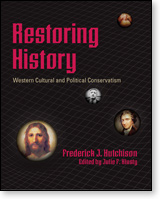 A message from Stephen Stone, President, RenewAmerica
A message from Stephen Stone, President, RenewAmerica
I first became acquainted with Fred Hutchison in December 2003, when he contacted me about an article he was interested in writing for RenewAmerica about Alan Keyes. From that auspicious moment until God took him a little more than six years later, we published over 200 of Fred's incomparable essays — usually on some vital aspect of the modern "culture war," written with wit and disarming logic from Fred's brilliant perspective of history, philosophy, science, and scripture.
It was obvious to me from the beginning that Fred was in a class by himself among American conservative writers, and I was honored to feature his insights at RA.
I greatly miss Fred, who died of a brain tumor on August 10, 2010. What a gentle — yet profoundly powerful — voice of reason and godly truth! I'm delighted to see his remarkable essays on the history of conservatism brought together in a masterfully-edited volume by Julie Klusty. Restoring History is a wonderful tribute to a truly great man.
The book is available at Amazon.com.
© Fred Hutchison
November 8, 2012
 Originally published April 12, 2005
Originally published April 12, 2005By coincidence, both Terri Schiavo and Pope John Paul II, the great advocate of the value of life, had feeding tubes inserted by doctors. Both Terri and the pope evidenced the desire to live: Terri did so by her sunny attitudes, and the pope did so by his writings about the sanctity of life.
The difference was that Terri was not dying, nor did she have control of events. The aged pope was dying, but could dictate what his health care should be.
Terri's feeding tube was pulled out in spite of her apparent desire to live, and she died according to the will of others. It was a painful death in spite of all the denials. The pope died at the time decreed by divine providence. He was peaceful at the end and his last word was "amen," meaning "so be it," as though he was accepting a visit of the death angel. He agreed with death when it came, but he did not arrange for its early arrival. He agreed with life until the appointed time of his departure from his mortal body.
Do we have the right to decide the hour of our death, or do we have the duty to live until the death angel comes for us? Is heaven the rightful arbiter of life and death, or do men have the right to take such matters into their own hands?
Common Christian experience teaches that in most cases, God keeps the time and circumstances of one's death secret, as though this information is something that trembling, fragile mortals cannot handle. Yet a large, influential minority of the population believes that the individual should have the right to determine the time and means of his death, once he decides that life is not worth living.
But is there any such thing as a "life not worth living?" Are not these code words that mean, "I lack the moral courage to face certain kinds of suffering?" Or do they mean, "I refuse to be humbled, lose control, and be reduced to a dependent state?"
Of course, the pride one refuses to surrender is partly an illusion. The control that some folks cannot bear to yield is partly an illusion. Many people can change aspects of their mode of living, and some can have a significant influence upon the world if they mean to have it, but mere mortals have no control of outcomes.
The illusion of control
 "The best laid plans of mice and men gang aft agley" (Robert Burns). (The best plans go askew.) Translations of Scottish dialect invariably water down the color and force of idiomatic expressions. "Gang aft agley" might signify to a man with Scottish peasant roots like Burns, a practical disaster. Picture Burns carefully steering a cart down a hill on a country lane. The cart picks up speed, breaks away, and runs "gang aft agley" off the road and crashes into a stone wall. A smart plan, good strong arm, and fixed will cannot insure against unexpectedly bad outcomes.
"The best laid plans of mice and men gang aft agley" (Robert Burns). (The best plans go askew.) Translations of Scottish dialect invariably water down the color and force of idiomatic expressions. "Gang aft agley" might signify to a man with Scottish peasant roots like Burns, a practical disaster. Picture Burns carefully steering a cart down a hill on a country lane. The cart picks up speed, breaks away, and runs "gang aft agley" off the road and crashes into a stone wall. A smart plan, good strong arm, and fixed will cannot insure against unexpectedly bad outcomes.Doctors were certain that Terri would not suffer, but she suffered anyway. The carefully steered cart went off the road and crashed. We cannot control outcomes, and our myopic eyes blur and our clumsy hands fumble when we try to manipulate the delicate process of dying.
In Shakespeare's Romeo and Juliette, Juliette took a potion that simulated death to escape an arranged marriage and then, with assistance, planned to sneak out of the tomb and elope with Romeo. The plan went awry because Romeo failed to receive the message that explained the plan. He discovered Juliet ostensibly dead in the tomb and killed himself. She awakened to find him laying dead next to her and killed herself. Disaster leads to disaster.
The classical Greeks understood that the hero can perform wondrous exploits, but only the gods can control destiny. If the hero was destined by the gods to doom, he was accounted noble if he behaved himself virtuously, fought his appointed battles, and displayed manly fortitude and insouciant flair as he calmly sailed with resignation into the jaws of inescapable death. The Greek heroes went to their doom with style, much like British gentlemen of a prior century who would tell dry jokes and puns on their way to the gallows.
The pope was as dry as an Englishman during his last days. He was asked how he felt during a time when he was wracked with pain. As a man calmly reconciled to his death, he responded with dry insouciance, "Below the neck, not so good." (I.e., I am fine, but this donkey of a body has gang aft agley.)
In contrast to the Greek, English, and papal model, the European tragic literature is fatalistic, for the hero had a hand in bringing himself down. In spite of all his virtues, powers, and victories, he is defeated in the end by a fatal flaw in character. For all his powers to bring change to the world and all his cleverness to manipulate events, he cannot stage-manage the outcome of his personal story. Despite all his influence upon events, the world spins off in directions he never imagined. Faust and MacBeth were tragedies of this kind.
 A life worth living
A life worth livingThe right-to-die movement insists we can be in control and we have the ability to know if life is worth living. Can we know when life is not worth living? Interestingly, the demand for Dr. Kevorkian's assisted suicides declined sharply when doctors started to aggressively treat chronic pain in the elderly, physically afflicted, and depressed. This medical revolution involves aggressive prescription drugs to relieve physical pain, and more subtle treatments of drugs and counseling to relieve the psychological pain of depression. Most requests for death are despairing desires to escape physical and psychological pain. Once the pain is relieved through medical treatment, the innate desire to live returns in most cases and thoughts of calling Dr. Death for assisted suicide are put away.
An investigation of the capers of Dr. Death might reveal some carts that have gang aft agley. Some folks are astonishingly difficult to kill. Murder is messy, and the Hollywood image of the hit man who administers a quick, clean, efficient death is a myth. The fastest way to disillusion a woman's right-to-choose advocate is to have her watch an abortion and to supply her with a barf bag in case she becomes ill. Life is beautiful, and murder is ugly. Death by enforced dehydration and starvation, as Terri Schiavo suffered, is one of the ugliest.
The pope was in great pain, but did not seek death because he had spiritual hope and believed that pain can play a role in the sanctification process. (See the pope's favorite book, The Dark Night of the Soul by St. John of the Cross, or see my book titled The Stages of Sanctification, at Amazon.com, for more information about links between pain and sanctification.) Spiritual hope reinforces the innate desire to live, and spiritual duty engenders a commitment to complete the earthly journey assigned according to providential design, and to endure fiery ordeals in trust and surrender.
As for estimating what a "life worth living" might be, is any mortal being capable of understanding the mystery of life, much less able to evaluate the worthiness of a life? Such assessments are invariably made on shallow grounds, such as whether a person feels happy or useful.
 A feeling of liberation and new wisdom often comes with the realization that life does not necessarily have to have happy feelings or be useful in a utilitarian sense. Life in innately good apart from such calculations. The Creator has priorities for life that go far beyond transitory feelings and practical functions. Feelings and functions are the surface froth of a deep ocean. A spiritually and intellectually shallow society is easily seduced by spurious and superficial values based upon the surface froth of life, and may lapse into a dysfunctional code of morality.
A feeling of liberation and new wisdom often comes with the realization that life does not necessarily have to have happy feelings or be useful in a utilitarian sense. Life in innately good apart from such calculations. The Creator has priorities for life that go far beyond transitory feelings and practical functions. Feelings and functions are the surface froth of a deep ocean. A spiritually and intellectually shallow society is easily seduced by spurious and superficial values based upon the surface froth of life, and may lapse into a dysfunctional code of morality.Why did the Terri Schiavo case center around the question of what Terri "would have wanted before her brain damage if she knew what was ahead"? From whence comes the assumption that a person should be allowed to commit suicide if they want to? If we recall the Existentialist revolution of the 1950's and sixties, some of the answers come clear.
The Existentialist revolution
Americans have valued free will and personal autonomy since the founding of the Republic. However, prior generations did not necessarily associate the act of choosing with virtue or being in the right. After all, one may freely choose vice, perversion, and criminality. The freely chosen course of action must be moral and wise to be worthy of commendation.
The philosophy of Existentialism places the emphasis on the mode of choosing, instead of the intended outcomes of the choice. It places the value upon subjective questions such as whether the choice was really free — independent of pressures to conform — and whether the person is committed to his choice. What matters to Existentialists is whether one's choices are "authentic" and "sincere."
These are indeed interesting questions.
But if these are the only questions we ask, we may never get around to considering whether the outcomes of our decisions are wise, prudent, responsible, and edifying to our families and our communities. If others get hurt by our choices, it is easy to evade responsibility if we look at the freedom of the will as the highest arbiter. "Let my will be done though the heavens fall." This is deliberate misquote of Lord Mansfield's famous saying concerning a slavery trial, "Let justice be done though the heavens fall." Existentialism replaces justice with free will as the highest imperative. When free will becomes an end in itself, the moral law is brushed aside. The universal moral law exists so that man should learn to live within boundaries and reign in his will, so that freedom is a blessing and not a curse.
Existentialism and commitment
 The philosophy of Existentialism has gone through a complex and tangled development since the time of Soren Kierkegaard (1813–1855), who invented a Christian Existentialism of sorts. The form of Existentialism that influenced American culture in the 1950's and 60's was the atheistic French Existentialism promoted by Jean Paul Sartre (1905–1980) and Albert Camus (1913–1960). Sartre and Camus rejected the universal moral law and values imposed by society.
The philosophy of Existentialism has gone through a complex and tangled development since the time of Soren Kierkegaard (1813–1855), who invented a Christian Existentialism of sorts. The form of Existentialism that influenced American culture in the 1950's and 60's was the atheistic French Existentialism promoted by Jean Paul Sartre (1905–1980) and Albert Camus (1913–1960). Sartre and Camus rejected the universal moral law and values imposed by society.Sartre insisted that human existence is always individual and particular. It is always a case of my existence and your existence, and the two are radically separate as though each of us lives sealed in a morally air-tight world. Sartre defined existence as a mode of being. The way one chooses to live is his particular mode of being. As the individual chooses from a wide range of possibilities and commits himself to those choices, he defines his existence.
What is important to Sartre is not which choices are made, but how they are made. What matters is whether the choices are made with commitment and sincerity, and whether one chooses with absolute freedom — that is to say, freedom from guile, from the conformist opinions of others, from the values of society, and any notion of a transcendent realm or a universal moral law.
An Existentialist can be hard as nails in sticking to his choices once he convinces himself he chose freely, sincerely, and with commitment. If someone condemns his choice based upon a higher moral law, he will be outraged. The Existentialist is convinced that he has the right to contrive a private moral world all of his own, and any challenge to that private world is a moral outrage and a threat to freedom. These folks are in earnest and they are not playing games — to the extent they are real Existentialists, and not mere hypocrites playing Existentialist games to rationalize misbehavior. The two kinds are hard to tell apart, of course.
What do Existentialists mean when they speak about commitment? They often mean sticking with a decision and not worrying overmuch about the outcomes. Sincerity in the decision and commitment to the decision are tests of "authenticity."
One has an authentic existence if he chooses his mode of life with sincerity and commitment. Does commitment mean taking responsibility for one's actions? In the sense of standing up for one's decisions, yes. In the sense of taking responsibility for the harm one's actions cause others, maybe not. A nihilism and antisocial streak runs through the writings of Sartre and Camus.
 Once one severs the links with the universal moral law and with obligations to society, sliding down the slippery slope towards narcissism, nihilism, and irresponsible behavior are almost inevitable. Sartre himself slid down that slope. He sat through World War II in Paris sidewalk cafes jotting notes about his philosophical ideas. Kierkegaard would have regarded that as inauthentic, irresponsible, and unaware behavior, and sins against Existentialist ideals.
Once one severs the links with the universal moral law and with obligations to society, sliding down the slippery slope towards narcissism, nihilism, and irresponsible behavior are almost inevitable. Sartre himself slid down that slope. He sat through World War II in Paris sidewalk cafes jotting notes about his philosophical ideas. Kierkegaard would have regarded that as inauthentic, irresponsible, and unaware behavior, and sins against Existentialist ideals.During the sixties, Sartre demonstrated his "commitment" by becoming a quasi-Marxist and visiting college campuses and egging on the rioting students to revolution. The economic determinism, utopian ideals, and socialist theory of Marxism meant nothing to Sartre. Communist totalitarian socialist systems are the very nemesis of the radical freedom of Existentialism. The essential thing to Sartre was active commitment to a movement that defies the "system" and its conformist values.
But to overthrow a system that upholds human rights and the freedom to be an Existentialist is irresponsible. Sartre slipped far from taking responsibility for the potential outcomes of his actions. If Sartre was capable of such cosmic irresponsibility, how likely is it that he would take responsibility for a wrong done to his neighbor? Existentialism is strong on the rights of freedom, but is weak on the responsibility of the citizen.
 The slow infection of Existentialism
The slow infection of ExistentialismDuring the 1950's, French Existentialism became popular among American intellectuals and its bohemian subculture. Lee Strasberg, the founder of the Actor's Studio, invented "method acting" in which the motions of an actor are guided by spontaneous feelings, discovered through emotional introspection. Such acting is "authentic" and not mimed.
Method acting is a mixture of Existentialism and the phenomenology of Edmund Husserl (1859–1938). Indeed, Husserl was as much the father of French Existentialism as was Kierkegaard. That is why Existentialists of the fifties talked so much about feelings and why the Actor's Studio was preoccupied with moods and feelings.
Hollywood method actors like James Dean, Marlon Brando, Paul Newman, and Rod Steiger, who were graduates of the Actor's Studio, introduced the American public to emotion-driven Existential attitudes. Even Marilyn Monroe became a protege of Lee Strasberg and became a method actor, a decision that proved fatal to that emotionally-disturbed woman.
The emotive method-acting fad began to wind down when Clint Eastwood demonstrated in the "spaghetti westerns" that the cool minimalism of a man of steely will can be more powerful on the screen than sincere hysteria of the "Hey Stella!" variety, or the unfocused slouch and mumble. "What are you rebelling against," you rebel without a cause? "Whad ya got?" was the inarticulate response. Nonetheless, the slow infection of Existentialism seeped into the pores of the general public through the method actors in Hollywood films of the fifties and early sixties.
During the sixties, Existentialism became a fad on the college campus. The intellectual students attended Existentialist lectures, read Existentialist theory, or went to Existentialist plays. But most students acquired Existentialism by osmosis, from a mood in the air, from music and films such as Easy Rider and The Graduate, and from the Zeitgeist (the
 spirit of the age). During the late sixties, many campuses had Woodstock-style rock and drug festivals, political upheavals, and a sexual revolution.
spirit of the age). During the late sixties, many campuses had Woodstock-style rock and drug festivals, political upheavals, and a sexual revolution.An acquaintance of mine in college justified his sex with a casual girl friend as 1) mutual consent, and 2) a "beautiful experience." He was an Existentialist because he said this in dead earnest with no winks, nods, or smirks. Consent and good feelings make it authentic, or so he believed.
An attractive, promiscuous girl rejected the proposal of marriage from a friend of mine because he was not "sincere." She was more promiscuous than he was, and he was more interested in the commitment of marriage than she was, but somehow he failed her sincerity test. His wounded emotions after this rejection seemed pretty sincere to me. Promiscuous Existentialists are very sincere in their way, of course. After all, Sartre had a harem of groupies, and he was a morbidly serious man. One can be dreadfully sincere about hedonism and nihilism, especially if one is French.
The sexual revolution and abortion
Existentialism on the campus — devoted to carpe diem (seize the day), and indifferent to consequences — swiftly led to a sexual revolution in academia in the late sixties. The infection spread to the general culture in the seventies. It was greatly aided by pop psychology which promoted "self-esteem," "self-actualization," and "taking control of your life." Soon, just as the sexual revolution was in transition from campus to general culture, abortion became a major issue and was hastily placed into law by liberal-minded judges.
 Planned Parenthood vs. Casey (1992) reveals that a majority of the court supports Existentialist values concerning abortion. Justice Anthony Kennedy wrote in his opinion, "At the heart of liberty is the right to define one's own concept of existence, of meaning, of the universe, and the mystery of life." These words are pure Existentialism and could have been written by Sartre or Camus.
Planned Parenthood vs. Casey (1992) reveals that a majority of the court supports Existentialist values concerning abortion. Justice Anthony Kennedy wrote in his opinion, "At the heart of liberty is the right to define one's own concept of existence, of meaning, of the universe, and the mystery of life." These words are pure Existentialism and could have been written by Sartre or Camus.Defining one's own mode of existence is the very heart of the Existentialist project. However, not only is the personal mode of living to be self-defined, the universe and life itself are to be self-defined. If all men invent their own private universe, how can society exist? For that matter, how can a family or a community exist? If one is free to concoct a private definition of life, how can murder be contained? The murderer can claim that his victim did not deserve to live because he was not living an authentic life. Justice Kennedy's Existential line is a code for nihilism, anarchy, and violence.
 The culture of abortion is Existentialist in its values. A woman's "right to choose" was contrasted by the feminists with the "bondage" of the old days, when women were hemmed in with responsibilities to others. Nothing less than radical Existentialist freedom would do for the new liberated woman. Even the idea that actions have consequences must not interfere with absolute freedom. If a woman chose sex for purposes of "self-actualization," no consequences like pregnancy must block the way. The impediment must be removed because achieving a free personhood of Existential authenticity is all that really matters.
The culture of abortion is Existentialist in its values. A woman's "right to choose" was contrasted by the feminists with the "bondage" of the old days, when women were hemmed in with responsibilities to others. Nothing less than radical Existentialist freedom would do for the new liberated woman. Even the idea that actions have consequences must not interfere with absolute freedom. If a woman chose sex for purposes of "self-actualization," no consequences like pregnancy must block the way. The impediment must be removed because achieving a free personhood of Existential authenticity is all that really matters.The hermetically-sealed narcissism of Existentialism makes it easy to look at the babe in the womb as a hunk of protoplasm that is part of the woman's body. As long as the baby is regarded as a possession of the mother and not a body, soul, and life in its own right, the shadow of Existentialism will hang over the land.
Sexual promiscuity, Existentialist style, and the shattered family will bring infinite injury to this unhappy land. When each person is seeking absolute freedom of the will as the highest virtue, there is no place left for the fidelity and responsibility of family life.
Dismal conclusions
After a holocaust of forty million aborted babies, the right to slaughter the innocent has been established in our laws and mores. The right to kill a baby in the womb has been extended to the right to kill a helpless person by removing her food and water. This was recently sustained by the Existentialist courts, of course.
 When each man becomes like a god and does what is right in his own eyes, the earth is filled with violence. (See Genesis 6:5, 11.) The radical atheism of French Existentialism insists upon absolute freedom, creating itself, by itself, thus assuming to itself the function of God. C. S. Lewis said, "When love becomes a god, it turns into a devil." Following this line of thought, when free will becomes a god, it turns into an agency for evil. At this point, we have dug down to the very core of the culture war. Our most urgent mission is to convince the American people that although free will is potentially good within limits, it is not a god.
When each man becomes like a god and does what is right in his own eyes, the earth is filled with violence. (See Genesis 6:5, 11.) The radical atheism of French Existentialism insists upon absolute freedom, creating itself, by itself, thus assuming to itself the function of God. C. S. Lewis said, "When love becomes a god, it turns into a devil." Following this line of thought, when free will becomes a god, it turns into an agency for evil. At this point, we have dug down to the very core of the culture war. Our most urgent mission is to convince the American people that although free will is potentially good within limits, it is not a god.Madame de Pompadour, mistress of Louis XV, had a premonition of the French Revolution and said, "Apres nous, le deluge." (After us, the deluge.) If we fail to convince our world that Justice Kennedy is wrong and that free will is not a god, then it may yet be that after Planned Parenthood vs. Casey will come the deluge.
 A message from Stephen Stone, President, RenewAmerica
A message from Stephen Stone, President, RenewAmericaI first became acquainted with Fred Hutchison in December 2003, when he contacted me about an article he was interested in writing for RenewAmerica about Alan Keyes. From that auspicious moment until God took him a little more than six years later, we published over 200 of Fred's incomparable essays — usually on some vital aspect of the modern "culture war," written with wit and disarming logic from Fred's brilliant perspective of history, philosophy, science, and scripture.
It was obvious to me from the beginning that Fred was in a class by himself among American conservative writers, and I was honored to feature his insights at RA.
I greatly miss Fred, who died of a brain tumor on August 10, 2010. What a gentle — yet profoundly powerful — voice of reason and godly truth! I'm delighted to see his remarkable essays on the history of conservatism brought together in a masterfully-edited volume by Julie Klusty. Restoring History is a wonderful tribute to a truly great man.
The book is available at Amazon.com.
The views expressed by RenewAmerica analysts generally reflect the VALUES AND PHILOSOPHY of RenewAmerica — although each writer is responsible for the accuracy of individual pieces, and the position taken is the writer's own.
(See RenewAmerica's publishing standards.)
